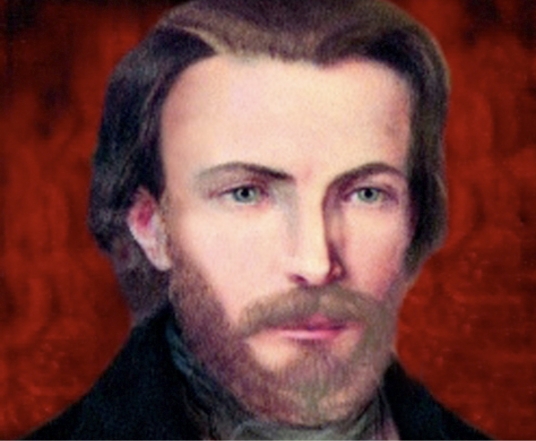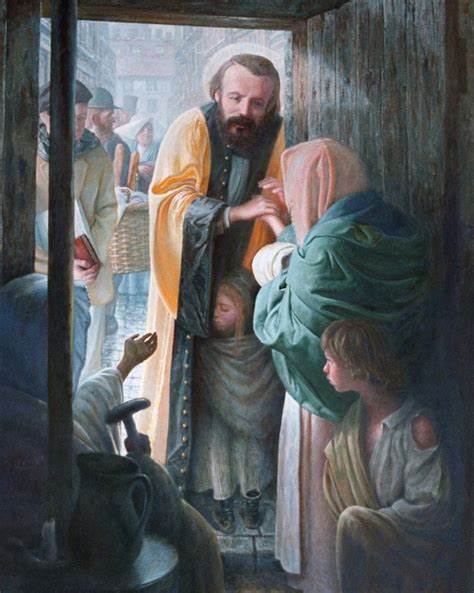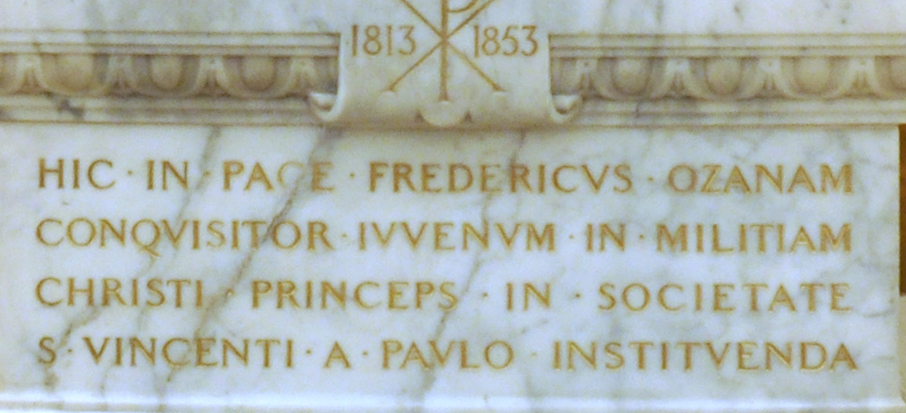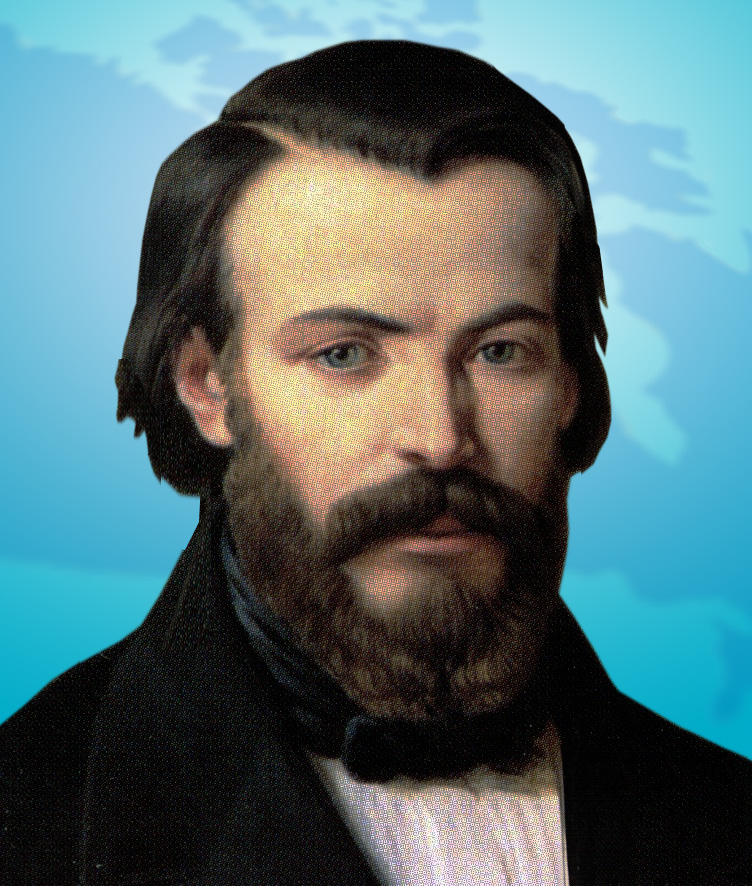
Blessed Antoine Frédéric Ozanam
Early Years (1813 – c. 1833)
Antoine Frédéric Ozanam was born on April 23, 1813, in Milan, which was then part of the Napoleonic Kingdom of Italy. He was the fifth of 14 children born to Jean-Antoine Ozanam, a doctor, and Marie-Françoise Ozanam (née Lasource). His family moved to Lyon, France, when he was a child.
At the age of seven he suffered the loss of his sister, Elise, which came as a great grief to him because they had grown close as she patiently helped him with his early lessons. Frederic became a day student at the Royal College of Lyons where he quickly showed an aptitude for and an interest in literature and where he would later become editor of a college journal, The Bee.
In a letter written when he was sixteen we have something of an autobiographical account of these early years:
“…They say I was very gentle and docile as a child, and they attribute this to my feeble health; but I account for it in another way. I had a sister, such a beloved sister! who used to take turns with my mother to teach me, and whose lessons were so sweet, so well-explained, so admirably suited to my childish comprehension as to be a real delight to me. All things considered, I was pretty good at this stage of my life, and, with the exception of some trifling peccadilloes, I have not much to reproach myself with.
At seven years old I had a serious illness, which brought me so near death that everybody said I was saved by a miracle,. not that I wanted kind care, my dear father and mother hardly left my bedside for fifteen days and nights. I was on the point of expiring when suddenly I asked for some beer. I had always disliked beer but it saved me. I recovered, and six months later, my sister, my darling sister, died. Oh! what a grief that was. Then I began to learn Latin, and to be naughty; really and truly I believe I never was so wicked as at eight years old. And yet I was being educated by a kind father and a kind mother and an excellent brother; I loved them dearly, and at this period I had no friends outside my family,. yet I was obstinate, passionate, disobedient. I was punished, and I rebelled against it. I used to write letters to my mother complaining of my punishments. I was lazy to the last degree, and used to plan all sorts of naughtiness in my mind. This is a true portrait of me as I was first going to school at nine and a half years old. By degrees I improved; emulation cured my laziness. I was very fond of my master; I had some little successes, which encouraged me. I studied with ardor, and at the same time I began to feel some emotions of pride. I must also confess that I exchanged a great number of blows with my companions. But I changed very much for the better when I entered the fifth class. I fell ill, and was obliged to go for a month to the country, to the house of a very kind lady, where I acquired some degree of polish, which I lost in great part soon after.
I grew rather idle in the fourth class, but I pulled up again in the third. It was then that I made my first Communion. O glad and blessed day! may my right hand wither and my tongue cleave to the roof of my mouth if I ever forget thee!
I had changed a good deal by this time; I had become modest, gentle, and docile, more industrious and unhappily rather scrupulous. I still continued proud and impatient.
At sixteen the young Ozanam started his course in philosophy and became greatly disturbed by doubts of faith for about a year. However, he was able to survive the ordeal with the help of a wise teacher and guide, Abbe Noirot, who was to exercise a strong influence on Frederic throughout his life. In the midst of this crisis, he made a promise that if he could see the truth, then he would devote his entire life to its defense. Subsequently he emerged from the crisis with a consolidation of the intellectual bases for his faith, a life commitment to the defense of Truth and a deep sense of compassion for unbelievers.
Ozanam writes: “It was then that the teaching of a philosopher priest saved me. He put my thoughts in order and light; I thought now with an assured faith, and received a rare benefit; I promised God to devote my life to the service of the truth that gave me peace.”

Despite a leaning toward literature and history, Frederic’s father decided on a law career for him and apprenticed him to a local attorney, M. Coulet. But, in his spare time, the young man pursued the study of language and managed to contribute historical and philosophical articles to the college journal.
In the Spring of 1831 Ozanam published his first work of any length, “Reflections on the Doctrine of Saint-Simon,” which was a defense against some false social teaching that was capturing the fancy of young people at the time. His efforts were rewarded with favorable notice from some of the leading social thinkers of the day including Lamartine, Chateaubriand and Jean-Jacques Ampere.
Ozanam also found time outside of work to help organize and write for the Propagation of the Faith which had begun in this same city of Lyons.
In 1831, at the age of 18, Ozanam moved to Paris to study law at the Sorbonne. The Parisian intellectual environment was vibrant but also marked by skepticism and anti-religious sentiment in the aftermath of the French Revolution. Ozanam found himself confronted with challenges to his faith from fellow students and professors. This period, while intellectually stimulating, also solidified his resolve to defend and live out his Catholic beliefs in a practical way.
His Works (c. 1833 – 1853)
This initiative rapidly grew and, in 1834, officially adopted the name Society of St. Vincent de Paul (SSVP). Ozanam was instrumental in shaping its foundational principles:
Ozanam’s most significant “work” and lasting legacy began in 1833, while he was still a student in Paris. In response to challenges from fellow students who questioned the practical relevance of Christianity, Ozanam, along with six companions, founded the Conference of Charity (Conférence de Charité). This small group aimed to demonstrate their faith through concrete acts of service to the poor. Inspired by the example of St. Vincent de Paul, they began by visiting the homes of the needy, providing food, clothing, and comfort.
- Person-to-person charity: Emphasizing direct interaction with the poor and marginalized.
- Spirituality: Rooted in prayer and Christian values.
- Lay-led organization: Run by ordinary lay Catholics.
- Global reach: Though starting locally, Ozanam envisioned its spread.

Beyond his philanthropic work, Ozanam pursued a distinguished academic career. He earned his doctorate in law in 1836 and then a doctorate in literature in 1839. In 1840, he was appointed to the Chair of Foreign Literature at the Sorbonne, a position he held until his death. His academic contributions included influential works on Dante Alighieri and the Germanic peoples. He was also a prolific writer and journalist, contributing to various Catholic publications and advocating for social justice and Christian principles in public life.
Ozanam married Amélie Soulacroix in 1841, and they had two children, a son who died in infancy, and a daughter, Marie. Throughout his life, despite his growing family and demanding professional commitments, he remained deeply committed to the growth and mission of the Society of St. Vincent de Paul.
His Death and Beatification
Frédéric Ozanam died on September 8, 1853, in Marseille, France, at the relatively young age of 40. His death was a profound loss to the nascent Society of St. Vincent de Paul and to the broader Catholic intellectual community.
Frédéric Ozanam’s health, never robust, began to decline in the early 1850s. He suffered from kidney problems and overwork. Hoping to recover, he traveled to Italy in 1853, but his condition worsened.

The process for his beatification began shortly after his death. On August 22, 1997, Pope John Paul II beatified Frédéric Ozanam during the World Youth Day celebrations in Paris, declaring him “Blessed.” His feast day is celebrated on September 9th. The miracle attributed to his intercession, which led to his beatification, involved the healing of a young boy in Brazil from a malignant tumor in 1926.
Blessed Frédéric Ozanam is revered not only as the principal founder of the Society of St. Vincent de Paul, which now operates in over 150 countries, but also as a model of lay sanctity, intellectual pursuit, and dedicated service to the poor, embodying the practical application of Christian faith in the modern world.
Quotes from Blessed Frédéric Ozanam
It is our vocation to set people’s hearts ablaze, to do what the Son of God did, who came to light a fire on earth in order to set it ablaze with His love.
Charity is a tender mother who keeps her eyes fixed on the infant she carries at her breast, who no longer thinks of herself, and who forgets her beauty for her love.
Peace of heart – without it, no good can make us happy. With it, every trial, even the approach of death, can be borne.
Let us learn, first of all, to defend our belief without hating our adversaries, to appreciate those who do not think as we do, to recognize that there are Christians in every camp, and that God can be served now as always! Let us complain less of our times and more of ourselves. Let us not be discouraged, let us be better.
The best way to economize time is to ‘lose’ half an hour each day attending Holy Mass.
Knowledge of the poor and needy is not gained by pouring over books or in discussions with politicians, but by visiting the slums where they live, sitting by the bedside of the dying, feeling the cold they feel and learning from their lips the causes of their woes.

Being a Christian I glory in belonging to no other school than that of truth, which is the Church… I live by my faith.

Leave a Reply